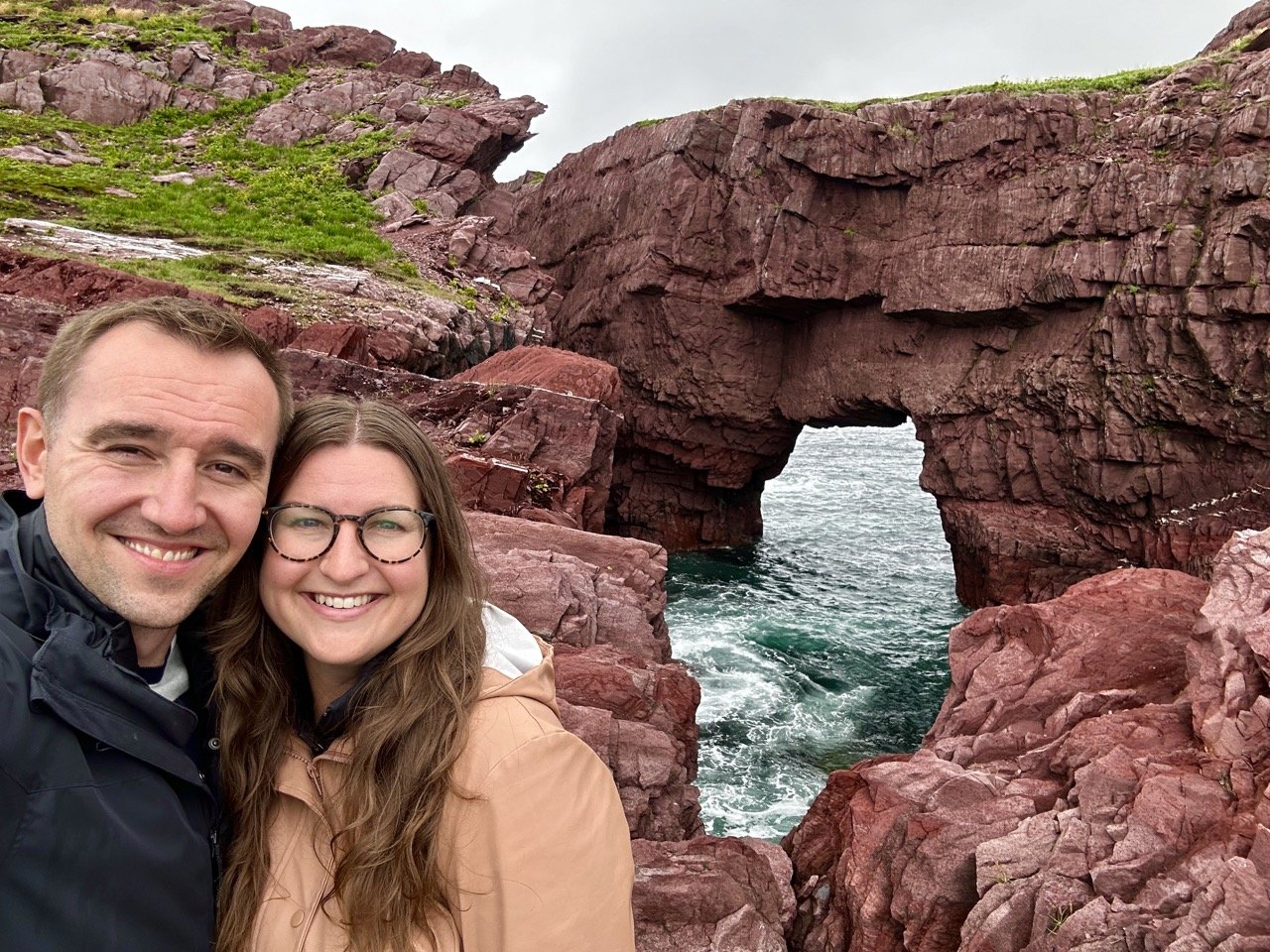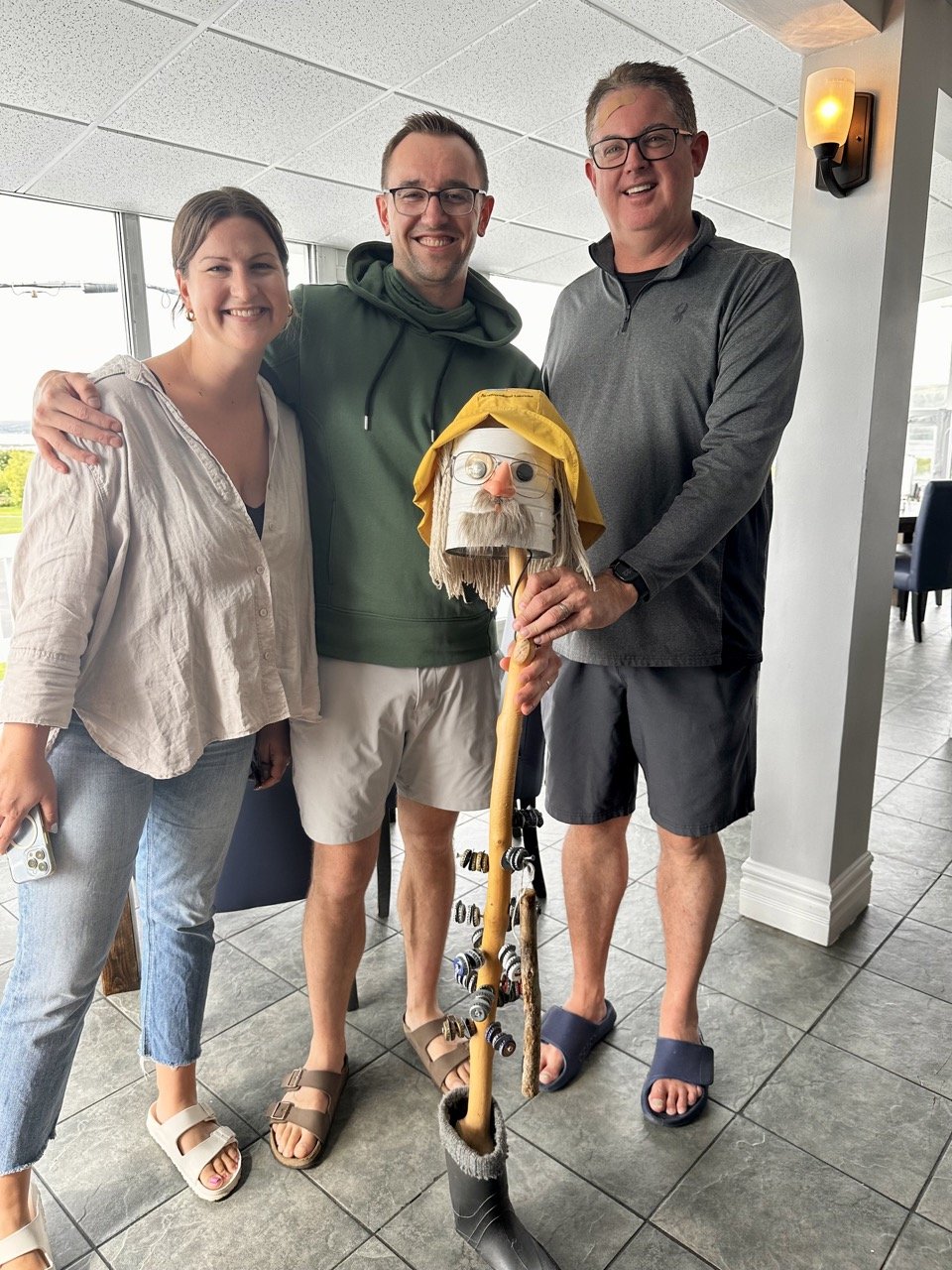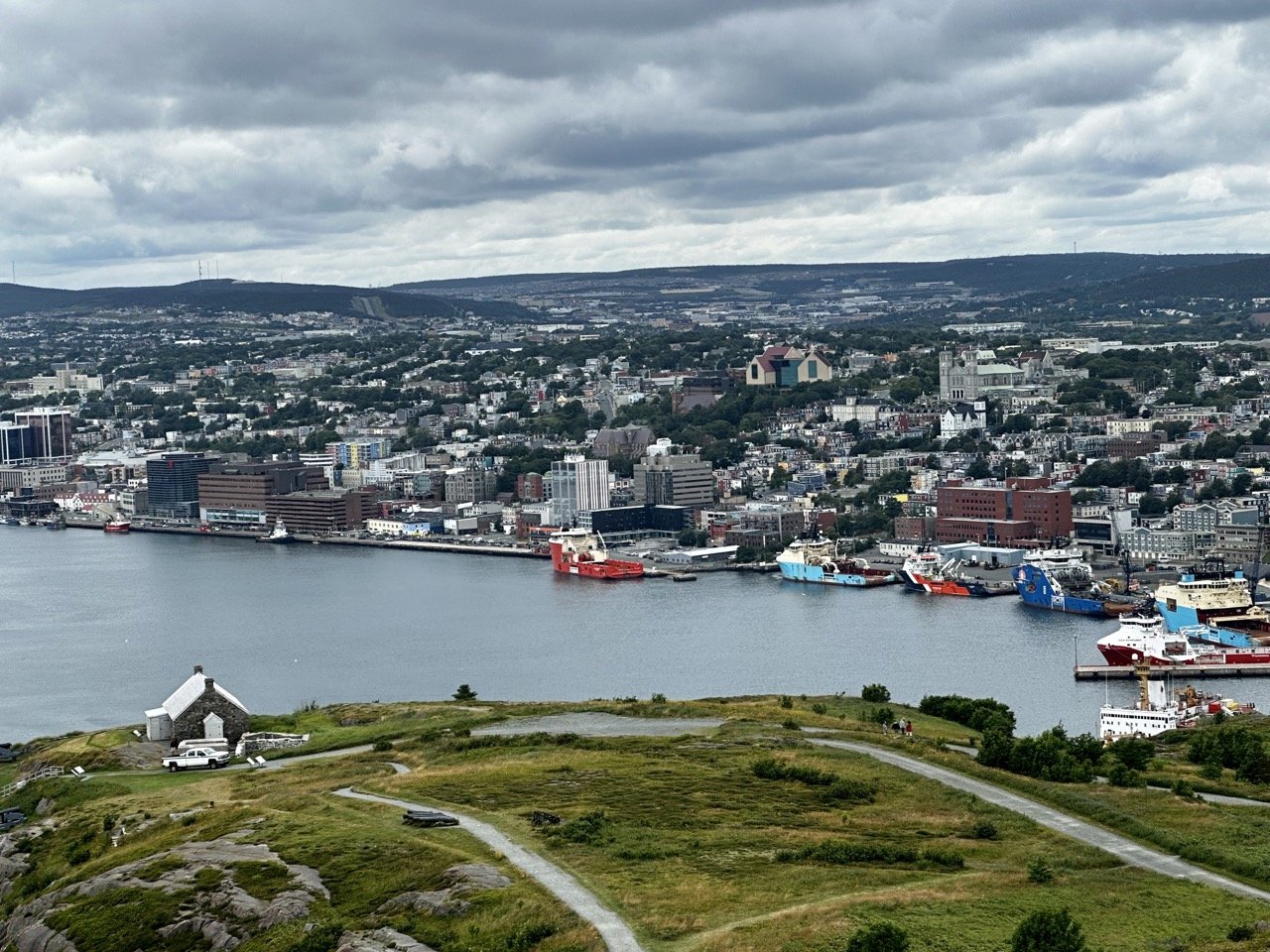What I Learned Spending One Memorable Month in Newfoundland & Labrador
Ever since I was a kid, growing up in Ontario, I’ve yearned to fully understand all provinces and territories on a deep, personal level. And thus, spending a month in Newfoundland & Labrador with Bri, as the Writers-in-Residence, was a dream come true. We came ready to learn, with the hope that by being present and listening carefully to the stories all around us, we might be able to share a few insights with you. And, here we are, the first article of many.
Bri and I at the Tickle Cove Sea Arch.
I have written this article in my head a few dozen times. I’ve thought about it while lying in bed, not quite asleep yet far from awake. I’ve let sayings and moments come back to me on long walks, quite some time after I’d left Newfoundland & Labrador’s borders. I’ve remembered a singer’s voice at a local bar, and the crashing of the waves on many, many shores, and tried to consider how I might internalize all of that - into this.
Spending a month in Newfoundland this past August with Bri, as the Writers-in-Residence for the province, changed my life, and I don’t use that phrase as an exaggerated colloquialism to bolster an article, but rather as an unequivocal truth. Something so clear and bare to me it feels irrefutable.
I feel as if we poured our hearts and souls into the duty of exploring this province in Canada’s east coast, with its undeniably unique culture and demeanour. We had late nights in St. John’s, and early mornings at St. Vincent’s amongst the whales. We had cold beers in Corner Brook, and hot tea at bed and breakfasts, where you could swear you were already family with the hosts approximately 4 minutes after you’d checked-in. We went to museums and historic sites, and climbed to the top of more lighthouses than you could count. We ate our weight in cod, and tried to walk it off on hiking trails galore.
I’ll get into the specifics of many of those adventures in articles down the line (there are many to come on this site and my sister site, We Explore Canada), but I’ve always felt that with travel writing, there needs to be a fine balance. Some articles help readers with direction, and some help via reflection. And so, here we are, focusing primarily on the latter. Ideally a treat for both reader and writer - a showcase of the idea that I was present for this whole month. Perhaps more so than I’ve ever been.
What, then, did I learn?
Please note that this post contains affiliate links. Simply put, this means that we may receive a small commission for our honest and heartfelt recommendations, at no additional cost to you.
The Weather is a teacher
Norris Point in Gros Morne National Park.
Many islanders I met joked that the weather is the top topic of conversation here, and that’s because there’s always something to talk about.
In Newfoundland & Labrador, the weather and the power of nature is something to be respected. It has to be. The landscape is unforgiving, and your day cannot be planned without understanding what the weather may have in store for you.
I remember a particular conversation that I had with Michelle Myrick, who runs The Keeper’s Kitchen in St. Shott’s, late one night around the dinner table. She summed it up better than I ever could when noting that “the weather is never 100% anything.”
That night I lay up thinking about that, and the affect that has on a place. You are, in a sense, forced to be present. You need to take note of what’s going on around you at that exact moment, and explicitly understand the connotations and impact of that.
Longtime readers will know that I’ve been studying stoicism (Seneca, Marcus Aurelius etc.) in one form or another, since my days living in Seoul (in 2011), and the approach here to the weather reminded me so much of the stoic approach to life. Most importantly, the idea that we can only control our reaction to what happens, not what happens.
We had this huge day of hiking planned when we were in St. Shott’s and woke up to thick fog and pouring rain. Instead of hiking, we made pots of coffee, played local music, and all sat in the living room, letting the day come to us. We didn’t even talk all that much, but we were there together, present.
You can plan whatever you like in Newfoundland, but it’s the weather that will tell you what you can and cannot do, the weather that will be your guide and teacher. And in this case, you need to listen.
It reminds me of the phrase that the famous Canadian sports broadcaster Elliott Friedman notes that his grandma always said to him when he was young - “you plan, god laughs.”
The weather in this province was the perennial reminder that we can only do so much to control what’s going on externally, but we can control how we react to it.
I have a theory that part of the province’s rich patchwork of storytelling and music comes from the acceptance that some days, you aren’t going to be able to set out and do what you planned, and as such, you could do a lot worse than cracking a beer, and letting a kitchen party unfold with all your neighbours within earshot.
Nature here is humbling, inspiring, and just about any other adjective you can conjure, depending on the day.
Forget about “six degrees of separation”
The old idea of six degrees of separation suggests that all people are six or fewer social connections away from each other.
Well, in Newfoundland & Labrador, I think that has to be amended to be “half a degree of separation.” By the end of the month, when we were recounting our adventures to some of the new people that we had the pleasure of meeting, we always found someone in common.
They knew the person who took us out on our whale watching tour, or their brother-in-law was the manager of a bed and breakfast we stayed in, or their cousin was a chef at a restaurant we’d eaten at.
At first, I just found this kind of curious, but I came to realize that it had more to do with the fact that human connection and community is the lifeblood of this province, and so the very first thing that you do when meeting someone, is try to establish and deepen that connection.
Jan on Battle Harbour telling us about the community of people that used to call this place home.
Everything and everybody is connected here. Yes, that may manifest as gossip by the fireplace or a local pub but, to me, it’s all derived from the idea that in a place like Newfoundland & Labrador, where the land is often indifferent to our human plights, you need the people around you to thrive and survive.
There’s an empathy and care for others in Newfoundland & Labrador that I’m not sure I’ve seen replicated elsewhere. I wonder if it’s something that was cultivated, at first, from the fishermen heading out on the water, and the respective communities keeping them in their thoughts until their safe return home. What a clear signal that the prosperity of a community is dependent on collective action.
That is probably too succinct an explanation, too black and white, but it is something I mulled over a fair bit.
YOu Will Not Understand its present, if you don’t take the time to understand its past
Listening to local storyteller Mike Sexton at Cafe Nymphe in Saint Lunaire-Griquet.
If your goal for your trip to visit Newfoundland is to snap a few Instagram-friendly pictures, and pretend you’ve seen this province, then I’m not the writer to read. There’s a strong distinction, as far as I’m concerned, between the traveller and the tourist, and I do everything I can to be the former.
The history of Newfoundland & Labrador is complex. It took me a month of in-depth conversation and research to even begin to understand it. How could I understand the depth of this province’s roots, without understanding its Indigenous history or the earliest settlement of Europeans at L’Anse aux Meadows around 1000 AD?
How could I understand how communities have changed without understanding the Cod Moratorium of 1992, and how that prompted a great exodus of people from their homeland?
How could I understand the Newfoundland & Labrador of 2023, without understanding the province that Joey Smallwood brought to the confederation table in 1949, and the changes he undertook in the years after?
I remember walking on a hiking trail one sunny afternoon alongside someone hailing from St. John’s, and I wanted to know how he saw Newfoundland & Labrador’s place in this world. “Well, Canada is my country, but Newfoundland is my nation,” he told me.
Nobody is shy to share their opinion in this province, something I loved in my role as Writer-in-Residence, and as a human being in general - but you need to come with the idea that there’s much to learn. Put down your phone in the pub, and pull a stool up to the bar, and join a conversation. Ask questions, and be curious, because there’s so much to learn, and a variety of perspectives on almost any issue.
Michael Crummey, one of my favourite writers from this province, has written innumerable works of fiction and books of poetry, all only about this province. I met him twice during my time here, at Winterset in Summer on the Eastport Peninsula, as well at Writers at Woody Point. I remember an audience member asked him if “he’d ever consider writing about anything but Newfoundland & Labrador,” and he quickly responded that he felt he needed the rest of his life just to do justice to all the stories there are to tell here.
That now makes perfect sense to me.
My main takeaway, however, is that you cannot tell stories about this nation, if you haven’t taken the time to understand the stories and things that have made this nation what it is.
It’s more awkward here to not say hello!
Being welcomed into the fold at the Edge of the Avalon Inn, learning about the tradition of the “Ugly Stick.”
I’ve spent the last few years in Toronto, after living in the likes of Oslo, Seoul and Istanbul. I’ve noticed that in Toronto, especially if you’re walking in the heart of downtown, there’s an intense aversion to locking eyes or, god forbid, sharing a few words or a moment with a stranger.
Immediately after arriving in Newfoundland & Labrador, I noticed the complete opposite trend. If you’re walking past someone in this province, whether it’s on a busy street, a secluded walking trail, or even out on the water, it’s actually a lot more awkward to keep those headphones in and avert your eyes.
Everyone here is ready for that simple moment of acknowledgment that I feel strongly is at the core of what it means to be human - to see each other, if only for a moment.
I smiled at more strangers in Newfoundland & Labrador that I perhaps ever have in my life. I had conversations with people who I’d never met, and that wasn’t an issue, because we both understood that we were indeed meeting in that very exchange.
It reminded me of a quote from Rod Mckuen that “strangers are just friends waiting to happen.”
I thought a lot about this, where this all came from, and concluded that it might have something to do with the notion that communities here tend to take responsibility for anyone who happens to be there. In Gander, they opened their doors to all those people who needed a place to stay and a bite to eat because they were in their community, simple as that.
I think that may extend socially as well. It didn’t matter if we were from that town or city or not, because we were there then, and that meant we deserved to at least have a smile and a hello.
A beautiful idea when you get right down to the heart of it.
The Lack of Rush
The view of St. John’s from Signal Hill.
People here have time for each other.
It was only after I spent a few days in this province that I began to understand that, in Toronto, there’s an undercurrent of “rush” that permeates everything. I imagine people on the corners of Toronto, working for charities or organizations, who are looking for people to stop for a moment and hear their story and donate, and how everyone responds that “they’re sorry, but they’re in a rush.”
Those charities and organizations would probably fair a bit better on a corner in St. John’s I’ve come to realize, and that’s because people have time for each other here.
It’s a hard thing to articulate with words, but I always felt as if, in the conversations I was having, people weren’t jittery and ready to move on to the next thing. Their full attention was on our connection, and I believe that’s intimately connected to the lifeblood of the province - that there isn’t anything more important than people.
That, in the end, all we have is each other, and so the moments we spend together should not feel like a small social courtesy that we’re willing to pay, but rather should be recognized as the richest part of our existence.
Further to that point, about embracing that “lack of rush,” I found that when I was driving at first, I was livid with the cars quite literally going below the speed limit in some places. I was always trying to get somewhere quickly, and I started to realize that perhaps that sentiment wasn’t always shared.
However, I put the road rage that comes standard in Toronto DNA away, and eventually came to enjoy the fact that I could see more if I was driving slower.
I’ve connected that phenomenon to the idea that Newfoundlanders truly understand, better than I initially understood, that it’s about the journey, not the destination.
Don’t Be Surprised If Where YOu’re headed has More than one Name
This province is comprised of storytellers, and so you’ll often find that a place you’re headed has one name on the map, a different name that they use locally when they’re recounting tales from times past, and perhaps another name that visitors have called a site, and the local community has taken note of.
Don’t get caught up in the confusion of it all. Embrace the variety of perspectives and use it as an excuse to dive deeper into what that place means to the local community.
Don’t be surprised if a town, city, or popular tourist site has a handful of names, all of which are valid in their own respect.
Food IS an Entry point to understanding the culture
A seafood feast fit for kings and queens at Chucky’s in Happy Adventure.
Food, to me, is perhaps the most underrated part of travel in the province. We had some absolutely brilliant meals along the way.
In this instance, I’m not even really referring to one particular meal (although I do often think about the meal we had at the Mallard Cottage in St. John’s), but more the idea that most regions, and particular restaurants, are going to have something that they do rather well, and that people come from far and wide for.
Yes, you’ll get your fill of fish and chips, and it’ll be darn delicious, and you’ll find no shortage of Cod au Gratin, fishcakes and toutons - also all great, especially on a blustery day, but I found some of the best meals or food we had was the result of having a conversation and asking, “if you were me, what would you have?”
That led us to trying fresh bakeapple jam, or the local lobster or snow crab at Chucky’s in Happy Adventure, or shrimp and mussels that were caught that day, or cod that was caught an hour ago. And we went out on hikes with locals who gave us information about the incredible array of flora and fauna that make this place what it is.
I’ll write something more in-depth just about the cuisine and some of our favourite restaurants, but my point is that I don’t feel people pay enough respect to the meals that you’ll have here. The food is fresh, and we ate too many good meals to count.
No word of a lie, I have dreamt about the Fresh Local Cod en Papillote served with Sautéed Asparagus and Roasted Lemon Potatoes that I had at the Twine Loft in Trinity.
Don’t hesitate to ask for help if you ever need it
Andrew, from the Legendary Coasts of Eastern Newfoundland, showing us around Cape Spear—the easternmost point of mainland North America.
The people of Newfoundland & Labrador seem constantly ready to drop everything to help.
I remember when I first arrived, I was frustrated by the fact that there would be many pockets when I was travelling around where I wouldn’t have any data on my phone, just because of cell service not reaching certain areas. There was this panic that I felt that if anything went wrong, Bri and I wouldn’t have a phone to contact someone if we needed to.
However, that panic abated rather quickly when I began to understand that there were few doors that couldn’t be knocked on if it was required.
When we were staying at the Edge of the Avalon Inn, I recall a particular breakfast where the local gas station had run out of gas, and a guest had barely anything left in the tank and was talking about it with their partner. Before we knew it, the server has called a friend’s brother, who she thought may have some extra, and he was on his way with extra gas to fill up his tank.
These situations manifested, over and over.
And so, I never felt any panic whether we had a cell signal or not, because I knew there was always a shop, or restaurant or gas station or community centre over yonder where someone would welcome us with open arms if we ever needed anything.
Embrace the Unique sayings and vernacular
When I first arrived after my flight, I wouldn’t catch certain sentences, simply because they were new to me, but by the end, I wouldn’t even flinch when someone asked me, “waddaya at?”
I’m also fairly sure that I’ve used “yes b’y!” in pretty much all the situations that it can apply. Again, I’ll likely do a larger article on this alone, but I couldn’t be a stronger proponent of cultures that have sayings that are so intertwined with the culture at large.
The more that I learned about the expressions of each region of Newfoundland, the better I got to know them, and when I would break one out after a few pints, the whole table would be smiling - and they knew that I was there to learn and appreciate what makes their community tick.
On a global scale, we’re seeing smaller communities that are being amalgamated into larger communities and cities, and we lose something every-time that happens.
Part of the way that we can honour history and heritage is through language, and just as I try to pick of expressions of a foreign nation, be that in Europe or Asia, I did the same here. Wherever you are, it’s a sign to everyone that you’re grateful to be there and that you value a culture worth valuing. Now, you don’t want to go overboard by any means, but it won’t hurt you to learn a few Newfoundland sayings during your visit, that’s for sure.
Also, I can’t tell you how much I miss being called “love” and “sweetheart” pretty much everywhere I went. It was the epitome of endearing.
Thank You, Newfoundland and Labrador
This heart shaped little cove at Dungeon Provincial Park.
I’ve got a lot more to say, and will have plenty of articles coming out to help readers visit this province, but this article is largely a love letter to a province that stole my heart.
Obviously, I’ve thought a lot of about the adventures that Bri and I undertook. As a writer myself, I think I connected with the idea that the currency here is storytelling in some regard. But perhaps even more than that, I loved that it’s not a place where the frills and the bells and the whistles are coveted as much as elsewhere.
In some ways, it’s not about the hotel room, as much as it is the view outside of it, and I’m here for that.
This province seems to have no problem prioritizing what actually matters. It’s about the person you’re talking to across the table, not an overpriced cocktail which may be on it. It’s about sharing what you have, not showing what you have. It’s about smiling in spite of the weather and the circumstance, and laughing whenever you can. It’s about taking the time to breathe deeply by the Atlantic Ocean, and to stop at the top of hiking trails to watch a whale or an iceberg and be humbled.
It’s about playing music in a circle, everyone with their own instrument, makeshift or otherwise, and embracing the notion that, in that circle, there’s always room for one more.









